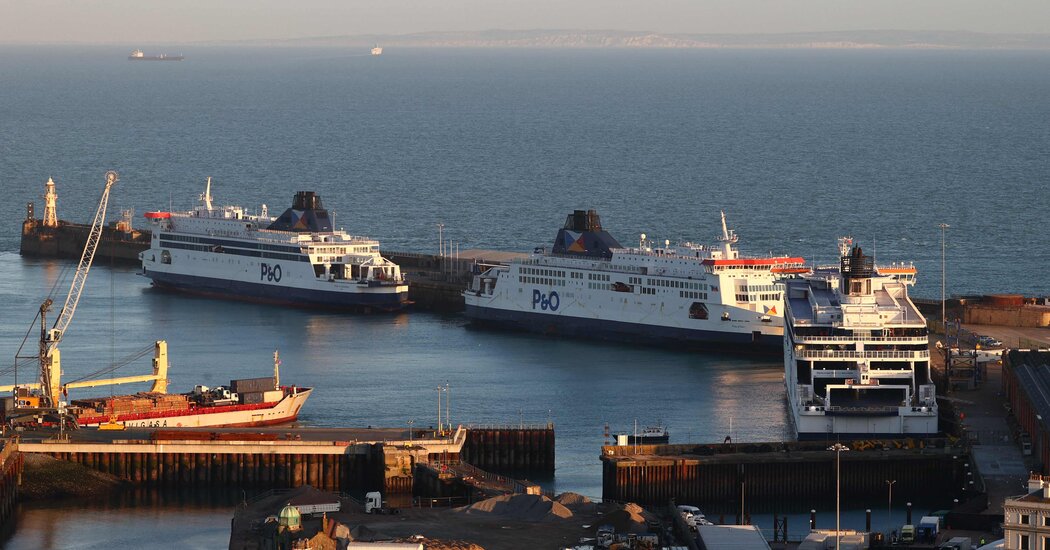The abrupt terminations caused widespread service cancellations and drew immediate backlash from government officials and unions.
LONDON — A British ferry company laid off 800 people with immediate effect on Thursday, many of them over video, leading to international travel disruptions and condemnation by government officials over its plan to cut service and replace staff with cheaper labor.
On Friday, the company’s ferries were at a standstill, without staff to crew its ships. P&O Ferries, which is owned by DP World, a shipping company based in Dubai, said on its website that there would be significant disruption to its services over the next few days as it became “a more competitive and efficient operator.”
Workers, their families and community members attended protests on Friday in the English port cities of Hull, Dover and Liverpool and the Northern Irish port of Larne.
Mark Dickinson, the general secretary of Nautilus International, a maritime workers’ trade union, said as he was leaving a protest of about 400 people in Dover that he had never seen a moment so low in his 40 years in the industry.
“I just think there’s been quite a bit of this hiring and firing lately, and this is the latest example,” he said. “There’s weariness, and people are just fed up.” In Britain, an island nation, seafarers are not thought of as essential workers, even though they have worked throughout the pandemic to bring food, medicine and other goods to the country, he said.
Understand the Supply Chain Crisis
- The Origins of the Crisis: The pandemic created worldwide economic turmoil. We broke down how it happened.
- Explaining the Shortages: Why is this happening? When will it end? Here are some answers to your questions.
- A New Normal?: The chaos at ports, warehouses and retailers will probably persist through 2022, and perhaps even longer.
- A Key Factor in Inflation: In the U.S., inflation is hitting its highest level in decades. Supply chain issues play a big role.
He said that P&O crew members received a notice early Thursday morning asking them to stand by for an important announcement, and that all vessels had been called to the port. Several hours later, employees were told over video by a human resources official that they were losing their jobs.
Ferries between England and France and the Netherlands were canceled for the next few days, P&O said on Twitter on Friday. The service disruption was likely to delay the movement of food, medicine and other goods between Britain and the rest of Europe, union officials said.
In an email to staff members on Thursday, Peter Hebblethwaite, P&O’s chief executive, said that the company was reducing its crewing costs by 50 percent to set the business up for growth. He said that P&O Ferries had entered a new partnership with an international crewing company, and that crew members from that company would staff ships affected by the change.
In a statement on Friday, P&O acknowledged that “for our staff, this redundancy came without warning or prior consultation, and we fully understand that this has caused distress for them and their families.” The decision was “a last resort,” the company said, adding that the business would not survive without fundamentally changed crewing arrangements.
The company said that it had notified all affected crew members who were working on Thursday in person aboard their vessels, and that the video was used to inform 261 of the 800 employees who were laid off.
Politicians expressed outrage about the firings and came under pressure to withdraw government contracts with the firm. Robert Courts, the under secretary of state at the Department for Transport, said in Parliament on Thursday that the way P&O had treated seafarers who had given years of service to the company was unacceptable.
“Reports of workers being given zero notice and escorted off their ships with immediate effect, while being told cheaper alternatives would take up their roles, shows the insensitive way in which P&O has approached this issue — a point I made crystal clear to P&O’s management when I spoke to them earlier this afternoon,” he said.
But opposition politicians said words from the officials in the ruling Conservative Party were empty without action. Nicola Sturgeon, the leader of Scotland, tweeted that she had spoken directly with the chief executive of P&O Ferries and expressed her “utter disgust at this appalling treatment of its workers.” She said the Scottish government would do everything it could to ensure their fair treatment.
The practice of firing workers and hiring new ones for lower pay is an age-old strategy for companies looking to cut costs quickly. Temporary workers typically make less money than full-time employees and have worse benefits and less job security.
Geoff Martin, a spokesman for the National Union of Rail, Maritime and Transport Workers, said that planned protests and union efforts to get the workers rehired would continue next week.
“It’s much of the modern management technique — to just treat the work force like scum on the expectation that you can get away with it,” he said. “And that’s what happened.”


























